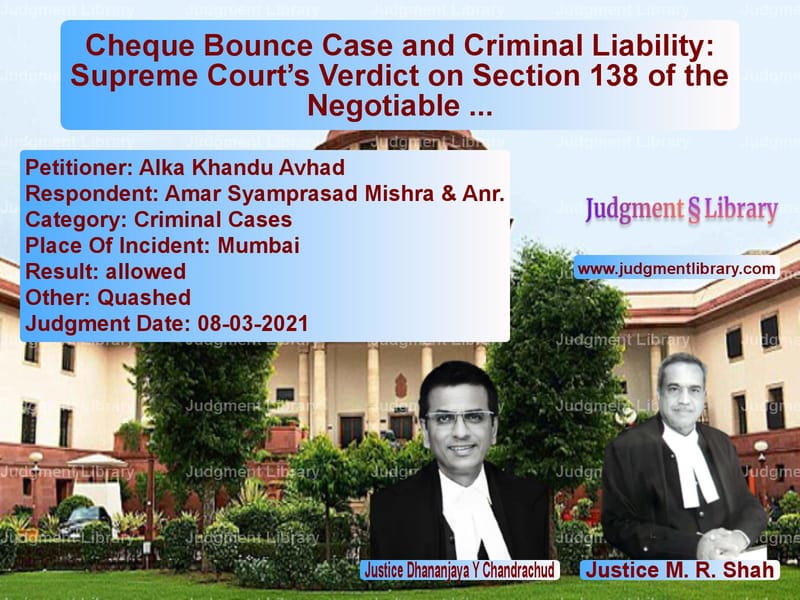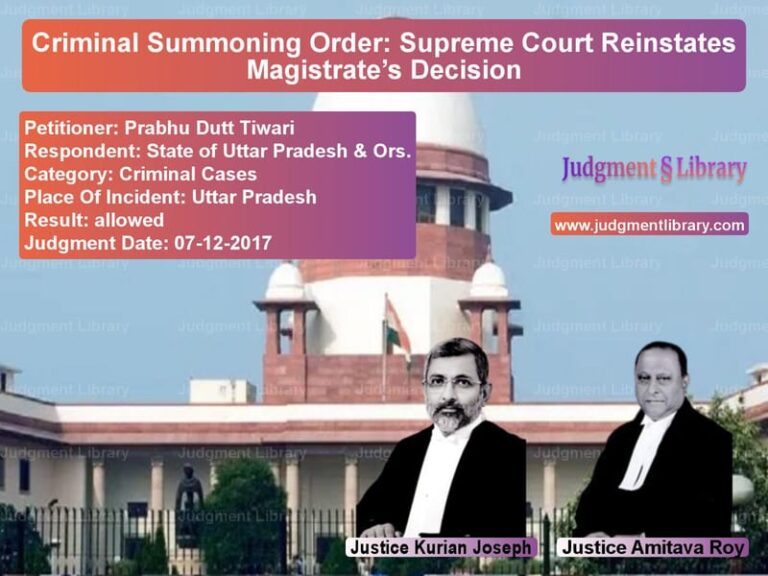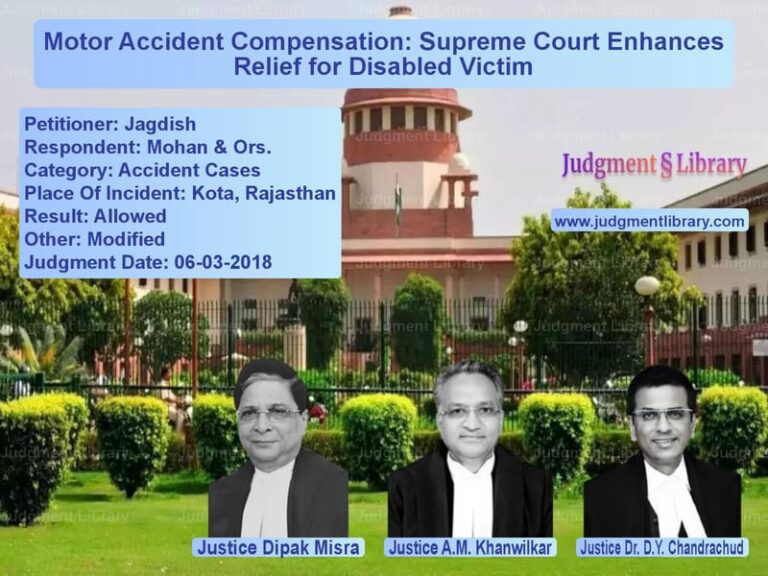Cheque Bounce Case and Criminal Liability: Supreme Court’s Verdict on Section 138 of the Negotiable Instruments Act
The case of Alka Khandu Avhad vs. Amar Syamprasad Mishra & Anr. revolves around the issue of criminal liability under Section 138 and Section 141 of the Negotiable Instruments Act, 1881 (NI Act). The Supreme Court examined whether a person who neither signed the cheque nor had a joint bank account with the signatory could be prosecuted under the said provisions.
Background of the Case
The dispute arose when respondent No. 1, a practicing advocate, filed a complaint against the appellant (Alka Khandu Avhad) and her husband for the dishonor of a cheque issued for legal services rendered by the complainant. The cheque, amounting to ₹8,62,000/-, was drawn by the appellant’s husband on his personal bank account and was returned due to insufficient funds.
The complainant, claiming joint liability of both husband and wife for the payment of legal fees, initiated criminal proceedings against both under Section 138 read with Section 141 of the NI Act. The appellant challenged this prosecution, arguing that she had neither signed the cheque nor had any direct involvement in its issuance.
Arguments of the Parties
Petitioner’s Arguments (Alka Khandu Avhad):
- The dishonored cheque was issued by her husband, not by her.
- The bank account was not jointly held; it was solely in her husband’s name.
- She was neither the drawer of the cheque nor its signatory.
- Section 138 of the NI Act requires that the cheque be drawn on an account maintained by the accused; since the account belonged solely to her husband, she could not be held liable.
- Section 141 of the NI Act applies only to corporate entities and partnerships, not to individual liability.
The Supreme Court took note of her arguments: “A person other than the one who has drawn the cheque on an account maintained by him cannot be prosecuted for the offence under Section 138 of the NI Act.”
Respondent’s Arguments (Complainant – Advocate):
- The legal fees were a joint liability of both husband and wife, as the legal services were provided to them both.
- Even though the cheque was drawn by the husband, it was issued to clear the liability of both.
- Section 141 of the NI Act allows for prosecution of individuals who are jointly liable for payments.
- The trial court had found a prima facie case, and therefore, the High Court was right in refusing to quash the complaint.
Supreme Court’s Analysis
1. Applicability of Section 138 of the NI Act
The Court laid down clear conditions for prosecution under Section 138:
- The cheque must be drawn by the accused on an account maintained by them.
- It must be issued for the discharge of a legally enforceable debt.
- It must be dishonored due to insufficient funds or exceeding the amount arranged to be paid.
The Court held that since the appellant neither signed the cheque nor maintained the account, she could not be prosecuted under Section 138.
2. Scope of Section 141 of the NI Act
Section 141 of the NI Act deals with offences committed by companies and makes key managerial personnel liable for acts committed by the company. The complainant had attempted to apply this provision to the appellant, arguing that she was jointly liable.
Read also: https://judgmentlibrary.com/legal-battle-over-cheating-and-assault-allegations-a-case-analysis/
The Supreme Court rejected this argument, stating: “Two private individuals cannot be termed as an ‘association of individuals’ under Section 141 of the NI Act.” The Court clarified that this section applies only to companies, firms, or similar entities and not to personal liability between spouses.
3. No Joint Liability Under Criminal Law
The Supreme Court further held that criminal liability under Section 138 is personal and cannot be extended merely on the basis of joint civil liability.
The judgment stated: “A person might have been jointly liable to pay the debt, but if such a person who might have been liable to pay the debt jointly, cannot be prosecuted unless the bank account is jointly maintained and that they were a signatory to the cheque.”
Final Judgment
The Supreme Court set aside the High Court’s order and quashed the criminal complaint against Alka Khandu Avhad. The key points of the judgment were:
- A person who neither signed a cheque nor maintained the account cannot be prosecuted under Section 138 of the NI Act.
- Section 141, which applies to corporate liability, cannot be invoked against individuals in a personal dispute.
- Criminal liability under the NI Act cannot be imposed merely based on joint liability to pay a debt.
- The complaint against the appellant amounted to an abuse of legal process.
With this judgment, the Supreme Court reaffirmed that criminal liability under cheque bounce cases must be strictly interpreted and cannot be extended beyond the direct involvement of the accused.
Petitioner Name: Alka Khandu Avhad.Respondent Name: Amar Syamprasad Mishra & Anr..Judgment By: Justice Dhananjaya Y Chandrachud, Justice M. R. Shah.Place Of Incident: Mumbai.Judgment Date: 08-03-2021.
Don’t miss out on the full details! Download the complete judgment in PDF format below and gain valuable insights instantly!
Download Judgment: alka-khandu-avhad-vs-amar-syamprasad-mish-supreme-court-of-india-judgment-dated-08-03-2021.pdf
Directly Download Judgment: Directly download this Judgment
See all petitions in Cheque Dishonour Cases
See all petitions in Fraud and Forgery
See all petitions in Contract Disputes
See all petitions in Legal Malpractice
See all petitions in Judgment by Dhananjaya Y Chandrachud
See all petitions in Judgment by Mukeshkumar Rasikbhai Shah
See all petitions in allowed
See all petitions in Quashed
See all petitions in supreme court of India judgments March 2021
See all petitions in 2021 judgments
See all posts in Criminal Cases Category
See all allowed petitions in Criminal Cases Category
See all Dismissed petitions in Criminal Cases Category
See all partially allowed petitions in Criminal Cases Category







